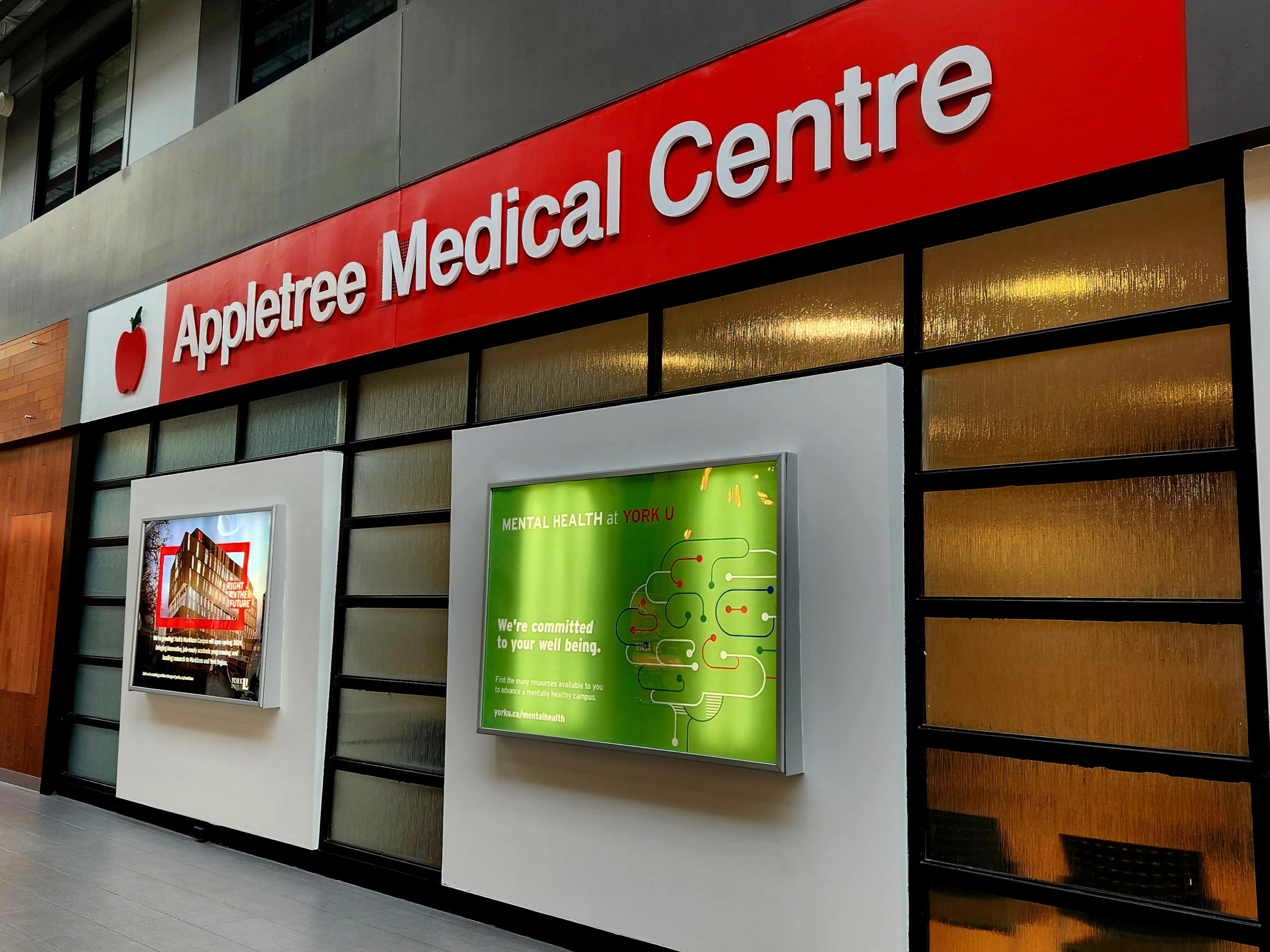On a busy day at York, the waiting area at AppleTree Medical Center in York Lanes is packed with patients. Anxious about a health issue or hoping to get an accommodations form, walk-in patients at AppleTree can often wait for over an hour, while the appointments can last less than ten minutes.
Long wait times and doctors who are just going through the motions are a standard experience to those relying on university health centres. However, patients seeking gender-affirming care are particularly affected.
Gender-affirming healthcare, such as hormone treatments or surgeries, relies on referrals to specialists. The narrow time slots at AppleTree are not designed to provide a lot of personal attention. They only allow space for a brief consultation.
Kore, a student at York and the coordinator of TBLGAY, a student-run service for 2SLGBTQIA+ people and allies, explains: “That brief appointment component is very important … Referrals rely on a lot of […] personal care, a lot of your doctor following up with the person they referred you to, and if you have a place that is as overburdened, that care is going to be missing.”
“In my experience and a lot of other folks’ experiences, while AppleTree will offer trans health care, you will often get very under-served by it,” concludes Kore.
Unfortunately, circumstances leave many to rely on AppleTree as a primary care provider. The scarcity of family doctors who accept new patients in Ontario makes it hard for York’s population of 10,000 international students to find a family physician.
The University Health Insurance Plan (UHIP) imposes even more limitations on where students can access healthcare. AppleTree is one of the few clinics that accepts UHIP directly, saving the students from inputting claims manually, which, with the Ontario Health Insurance Plan, would be taken care of by a doctor. This pushes even more students to the doors of AppleTree.
While there are nine family physicians available to the rest of the student body, Dr. Andrew Kriger is the only one who initiates hormone prescriptions for trans patients.
Dr. Kriger is only available on Mondays and Tuesdays. “If you are busy those days, then there’s not much you can do,” says Violet, a second-year cinema and media arts student at York.
To make matters worse, Dr. Kriger doesn’t exclusively attend to patients in need of gender-affirming care. At AppleTree, he practises as a family physician and sees walk-ins. This forces patients who seek trans healthcare to work around Dr. Kriger’s schedule.
A dedicated gender-affirming healthcare specialist at AppleTree would solve many of these issues. However, unlike University of Toronto, Ontario College of Art and Design and Toronto Metropolitan University, which have their own Health Centres, York outsources its healthcare through AppleTree, which means it cannot influence the creation of its own trans healthcare service.
In contrast, the Health and Wellness Centre at the University of Toronto, which is operated by the Division of Student Life, has a committed gender-affirming healthcare service. It provides ongoing care, as well as educates students to self-inject hormones. This means more attention to individual patients, longer appointment times, and improved accessibility.
An even bigger barrier for trans and queer patients at York is the absence of a comprehensive guide on how to access gender-affirming care.
Unlike TMU Medical Centre or OCAD Health and Wellness, which can be accessed by phone, students here must go to the clinic to ask questions specific to the Keele Street branch of AppleTree.
At York, TBLGAY spreads knowledge on how to seek referrals, hormone treatments, and navigate insurance.
Kore comments: “Since the healthcare system at York isn’t actually [from the university], there are no resources or guides from York itself on accessing trans healthcare here. [This is] a huge gap we have to fill with helping folks even realise it’s an option.”
Violet tells Excalibur that a friend referred her to Dr. Kriger, but others may not have been so lucky. “The person behind me in line said: ‘I also go to Dr. Kriger for my hormones. I will tell you from experience that you cannot get hormones from anybody else.’”
“I just imagine how many people have to go through this cycle of getting a different doctor from AppleTree until they find Dr. Kriger,” she continues. “If I had had to do that, it would have been too discouraging for me to get there; that would have drastically changed the trajectory of my life.”
AppleTree needs to do more to advertise its services to students. Its failure to inform leaves many in the dark, cut off from the help they didn’t know was there.
Both York and AppleTree have left those seeking gender-affirming healthcare to fend for themselves. Since York and the clinic function as independent entities, the university has washed its hands of any deficiencies AppleTree has.
For a university that prides itself on diversity and inclusion, York needs to step up and advocate for students to get the care they deserve.


